Key takeaways:
- Timeless poetry resonates with universal themes and evokes deep emotions, bridging past and present experiences.
- Contemporary poetry reflects modern complexities, often using accessible language and tackling social issues, inviting personal engagement.
- Key differences include timeless poetry adhering to traditional forms, while contemporary poetry embraces experimentation and challenges conventional boundaries.
- Poetry plays a crucial role in culture by preserving history, fostering emotional connections, and serving as a platform for social change.
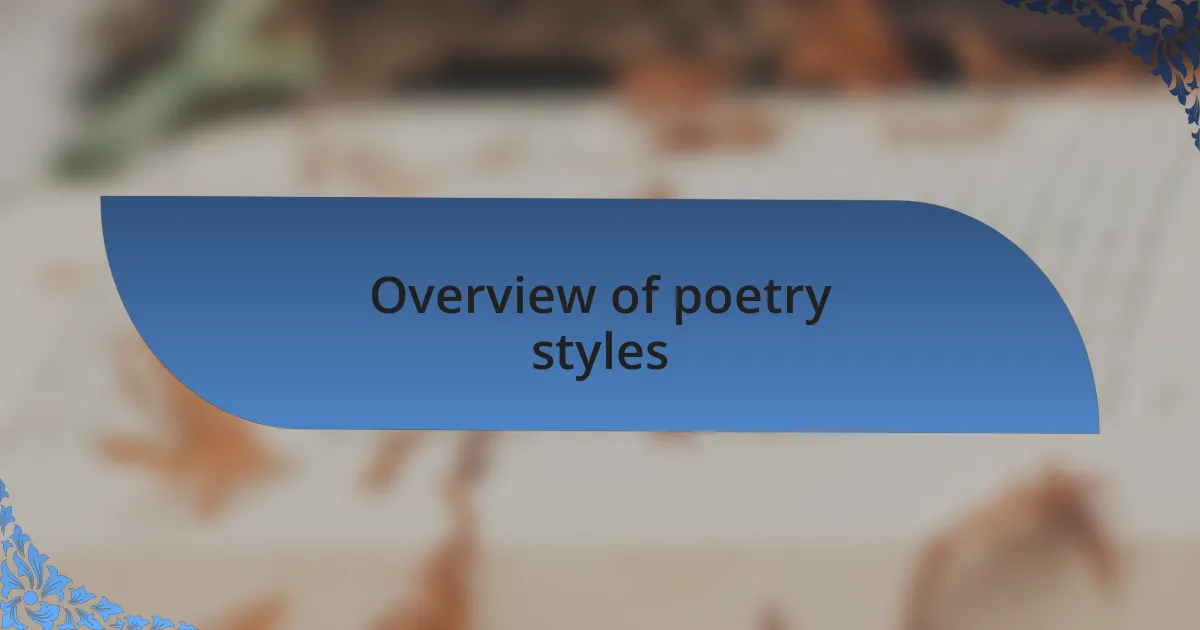
Overview of poetry styles
When I think about poetry styles, the contrast between timeless and contemporary works often stands out. Timeless poetry, like that of Shakespeare or Emily Dickinson, taps into universal themes—love, nature, and the human experience. It has a weight and depth that resonate across generations, making it feel almost like a comforting conversation with an old friend.
On the other hand, contemporary poetry often reflects the complexities of modern life, incorporating elements that might surprise or challenge traditional perspectives. I recall reading a contemporary piece that used social media terminology; it felt fresh and relatable, almost like it was written just for me in that moment. Isn’t it fascinating how poetry evolves, reflecting the culture and issues of its time while still reaching out to the emotional core?
Both styles have their unique merits. Timeless poetry invites reflection and introspection, while contemporary pieces often provoke thought and discussion. When I read a poem that cleverly combines elements from both worlds, I find myself wondering—can we truly separate the two, or are they simply two sides of the same poetic coin?
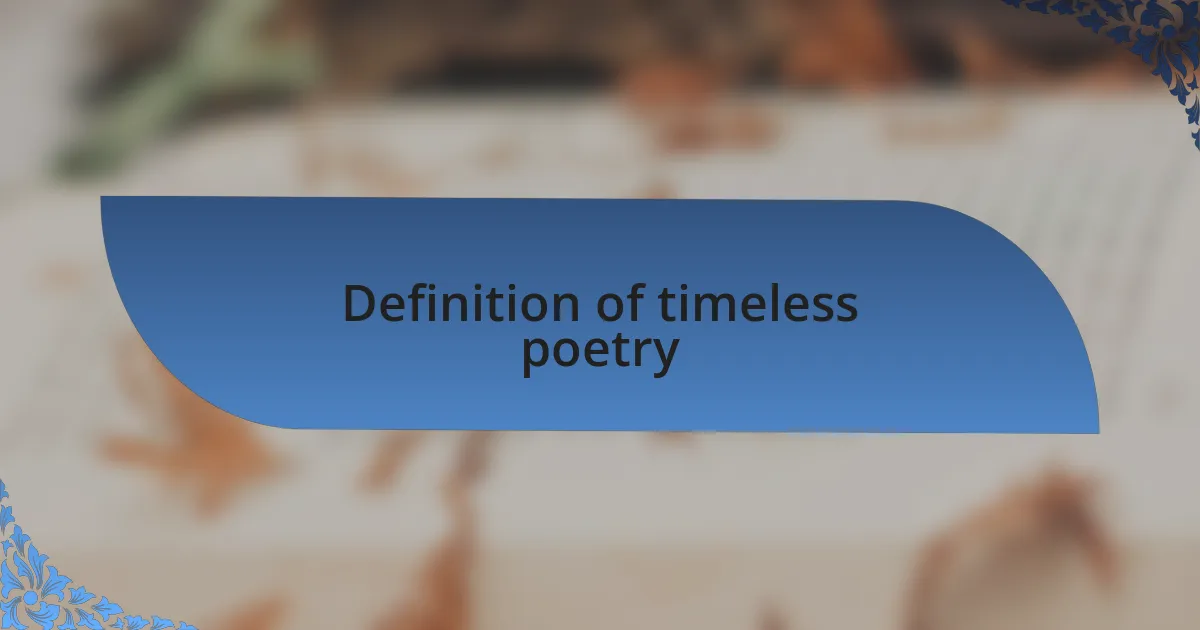
Definition of timeless poetry
Timeless poetry can be defined as works that transcend the era in which they were written, resonating with readers long after the ink has dried. This type of poetry speaks to fundamental human emotions and experiences, tapping into themes like love, loss, and the passage of time. When I read a poem by Robert Frost, for instance, I find his reflections on nature and human emotion so relatable that they feel as if they were penned just for me, regardless of the time period.
Often, the power of timeless poetry lies in its ability to evoke a sense of nostalgia. I remember stumbling upon a poem by William Wordsworth during a particularly contemplative evening, and its vivid imagery of the natural world transported me to a place of serene beauty. Isn’t it enthralling how these poems can bridge the gap between past and present, offering insights that resonate in today’s chaotic world?
Additionally, the enduring quality of timeless poetry is revealed through its use of rich language and structure. The carefully crafted verses and thought-provoking metaphors encourage readers to pause and reflect deeply. My experience with these works has taught me that while words may change over time, the emotions they convey remain timeless, inviting us to savor each line like cherished memories.
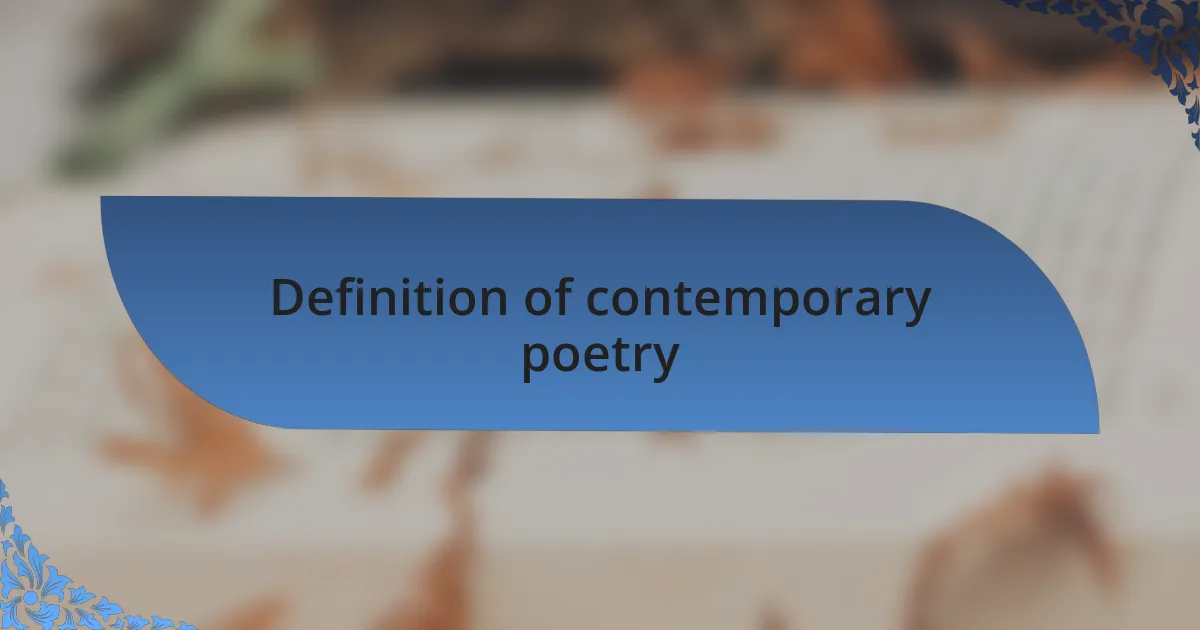
Definition of contemporary poetry
Contemporary poetry emerges from the vibrant fabric of modern life, reflecting the complexities and diverse experiences of today’s society. It often embraces a variety of styles and forms, allowing poets to experiment and express their unique voices. I recall reading a poem by Ocean Vuong that beautifully captured the struggles of identity and belonging in our ever-changing world, making me feel seen and understood in my own uncertainties.
One defining characteristic of contemporary poetry is its accessibility. Many poets write with a conversational tone, inviting readers into their intimate thoughts and feelings. When I encountered a spoken word performance, it struck me how the poet’s raw emotion transcended the written page, evoking reactions in real-time. This immediacy connects the audience to the poet’s personal narrative, making contemporary poems feel like conversations unfolding right before us.
Additionally, contemporary poetry often tackles pressing social issues, providing a platform for marginalized voices. I can’t help but admire the courage it takes for poets to address themes like racism, mental health, and climate change. Their work challenges readers to confront uncomfortable realities, urging us to reflect on our own convictions. Hasn’t a poem ever prompted you to reevaluate your perspective or sparked a need for change? That’s the power of contemporary poetry; it invites us not just to read, but to engage deeply with the world around us.
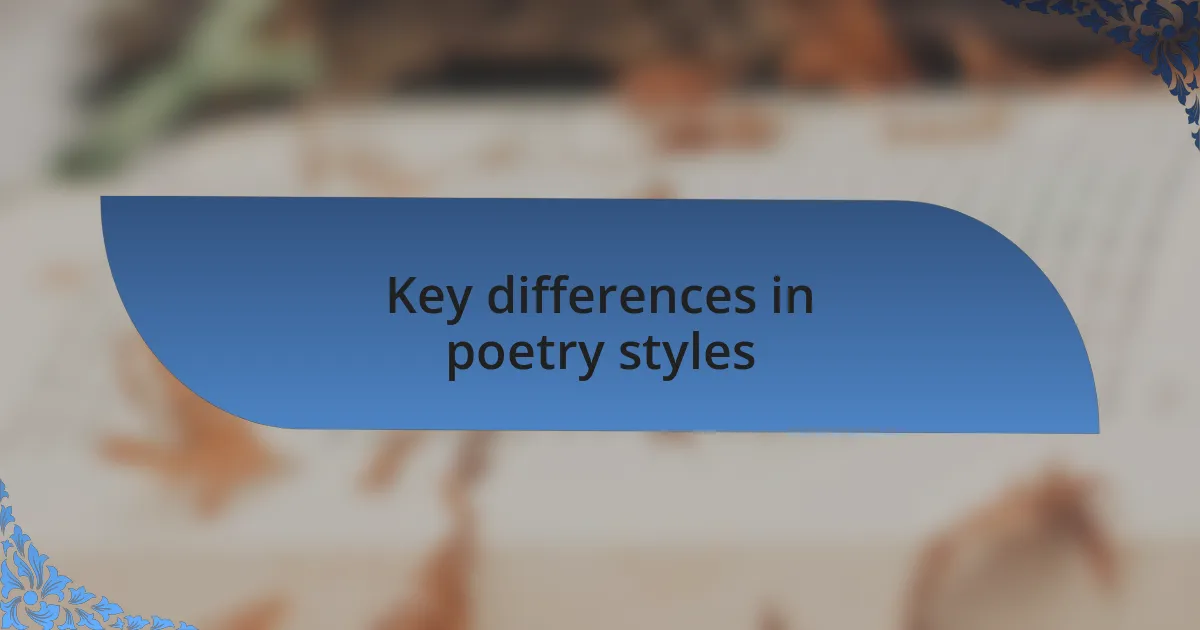
Key differences in poetry styles
When exploring the key differences in poetry styles, one notable aspect is how timeless poetry often adheres to traditional forms and structures, using established meter and rhyme schemes. For example, reading a sonnet by Shakespeare allows me to appreciate the musicality and discipline inherent in those conventions. There’s something striking about how those age-old patterns can still evoke emotion, showing that even rigid frameworks can express profound human experiences.
In contrast, contemporary poetry frequently plays with form and often defies conventional boundaries. I distinctly recall a poem that used fragmented lines and unexpected punctuation, reflecting chaos and spontaneity. This stylistic choice not only mirrors the unpredictability of modern life but also makes the reader feel as if they’re part of the unfolding narrative. Isn’t it fascinating how this experimentation can create a sense of immediacy, drawing us into the poem’s emotional whirlwind?
Moreover, the themes explored in timeless versus contemporary poetry differ significantly. While timeless poetry often delves into universal experiences—love, loss, and nature—contemporary poetry tends to grapple with the nuances of today’s issues. I recently found myself moved by a poem addressing digital loneliness, a concept that resonates with our technology-driven lives. Doesn’t it make you stop and think about how our modern connectivity can sometimes amplify feelings of isolation? This is where contemporary poetry shines, as it pushes us to confront the complexities of our current emotional landscapes.
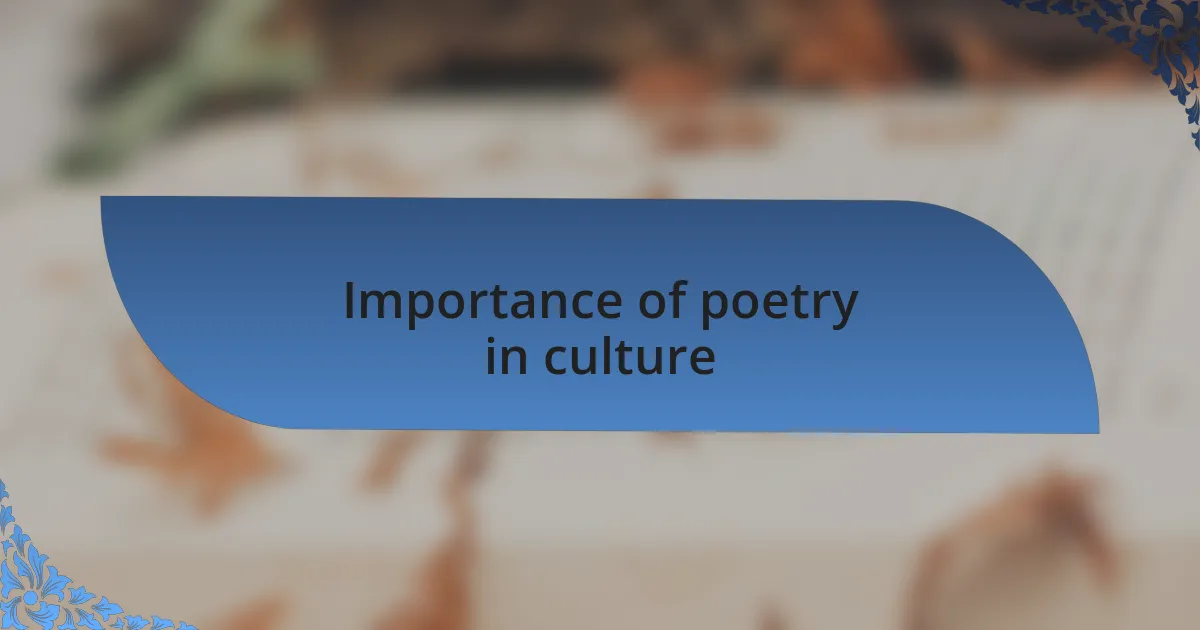
Importance of poetry in culture
Poetry is often the lens through which we view our culture, speaking to shared values and struggles. I remember attending a local poetry reading where the poet captured the essence of community resilience during challenging times. It struck me how verses can encapsulate collective experiences, acting as both a mirror and a rallying cry for social change. How often do we overlook the power of words in shaping our understanding of who we are collectively?
In many societies, poetry serves as a vehicle for preserving history and traditions. For instance, I’ve come across indigenous poetry that conveys age-old stories and cultural wisdom, passed down through generations. This not only honors the past but also empowers future generations to connect with their roots. Isn’t it incredible how a few carefully chosen words can hold the weight of an entire heritage?
Moreover, poetry often fosters emotional connections that transcend generations. I vividly recall a poem shared at my grandmother’s funeral, one that echoed her love and life’s teachings. It made me realize that poetry isn’t just about art; it’s also a way to navigate our emotions and bond with others over shared feelings. Have you ever found a verse that resonated so deeply it felt like it was written just for you? That’s the true beauty of poetry in culture—its remarkable ability to unite us through our most profound emotions.
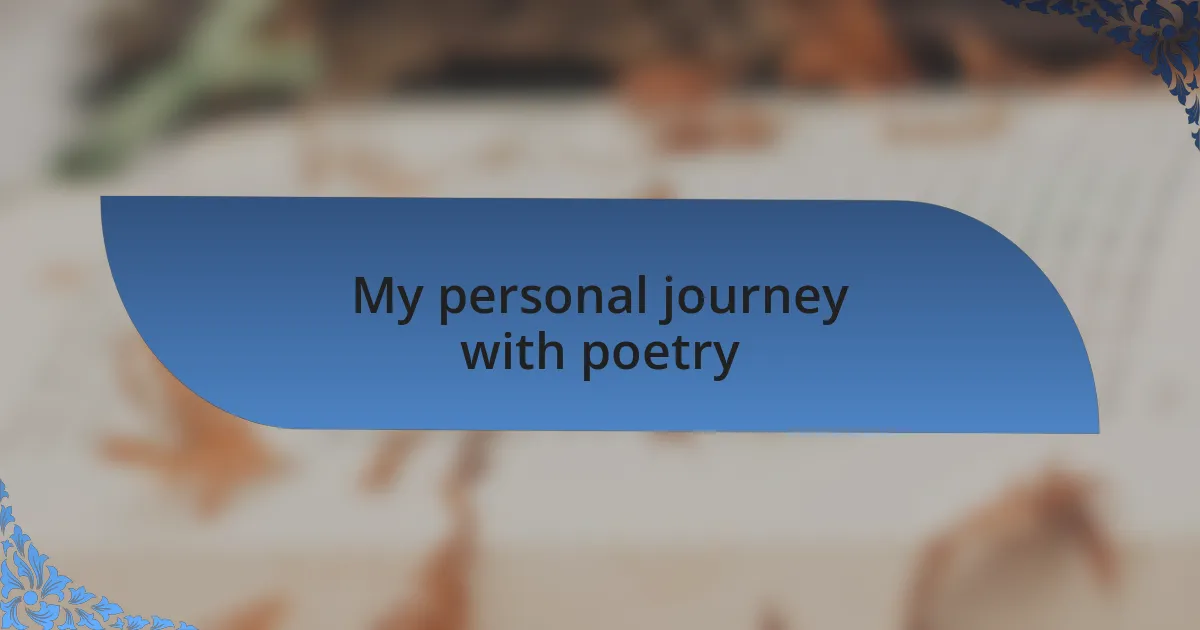
My personal journey with poetry
I first encountered poetry as a teenager, scribbling verses in the margins of my notebooks during class. It was a release, a way to express feelings that seemed too daunting to share. I often wonder how many others have found solace in writing, using words as a bridge to navigate their inner worlds.
As I grew older, my fascination deepened with the rhythm and musicality of language. One memorable moment was when I attended a workshop led by a local poet who encouraged us to embrace vulnerability in our writing. I remember sharing a piece about heartbreak; the room was silent, yet I felt an unspoken connection with everyone present. Have you ever experienced that feeling of unity in a gathered community of creatives? It’s something truly special.
Now, I often reflect on how poetry has shaped my identity. It has been a mirror, revealing my growth and changing perspectives. I can’t help but think about how many stories remain untold, waiting for someone to listen. Isn’t it remarkable how poetry can both capture our experiences and invite us to explore lives beyond our own?